#dionysius the areopagite
Text
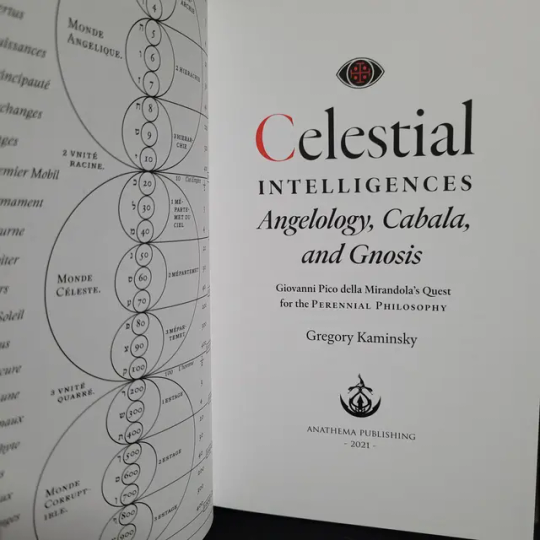
“With its roots in Jacob’s ladder and elaborated in biblical Jewish merkavah mysticism, the doctrine known later in Greek as theosis is found in the writings of Dionysius the Areopagite, and Symeon the New Theologian, as well as the Jewish Kabbalah as demonstrated by Joseph Karo, the Baal Shem Tov and his disciples. In other words, Pico intends his angelology in these two works to be understood by the learned classes throughout Europe as a prescription to achieve union with the divine.
By “divine union,” what is meant? The final snapshot of this arduous and paradoxical, or perhaps even inconceivable journey is different in various traditions. Different from the ecstatic, fiery, yet agonizing transformation of the prophet Enoch into the archangel Metatron, called “a lesser YHVH” in 3 Enoch,7 or the graphic, luminous transformation of the mystical abbot of St. Mammas Monastery in Constantinople, Symeon the New Theologian (949–1022), into the Body of Christ in the tenth century CE,8 Pico’s vision of theosis was more akin to sharing God’s “mind stream.” That is, instead of a merger of the corporeal human aspirant into the incorporeal infinitude of the godhead, theosis for Pico was a kind of gnosis and a point of view that was simultaneously individuated and collectively unified. This can be seen in his description of ultimate divine union as possible while the philosopher is incarnate, more akin to a supremely exalted state of consciousness. While achieving a state like this necessitated neglect of bodily cares and desires according to Pico, he also asserted that this prescriptive formula for divinization actually purified the body as a dwelling place for the divine presence.”
Celestial Intelligences: Angelology, Cabala, and Gnosis: Giovanni Pico della Mirandola's Quest for the Perennial Philosophy
#Perennial Philosophy#Divine Union#Gnosis#Theosis#Merkavah mysticism#Giovanni Pico della Mirandola#Divinization#Angelology#Celestial Intelligences#The esoteric tradition of the West#Kabbalah#Magic#Cabala#Christian Cabala#The orders of Angels#Jacob’s ladder#Dionysius the Areopagite#Symeon the New Theologian#Union with the Divine#Archangel Metatron#Picos vision of Theosis#The process of Spiritual Ascension#Kabbalistic Tree of Life#Angelic Hierarchy#The Cosmic Hierarchy#Renaissance Philosophy#Philosophical Wanderings
2 notes
·
View notes
Text
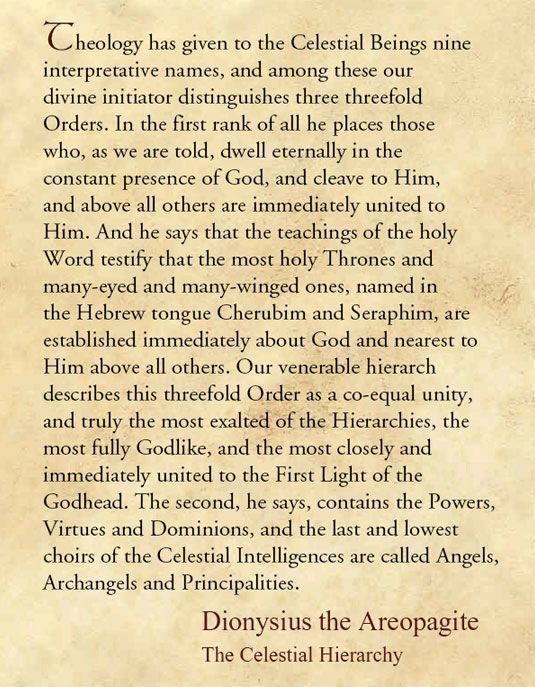
Dionysius the Areopagite - The Celestial Hierarchy
0 notes
Photo
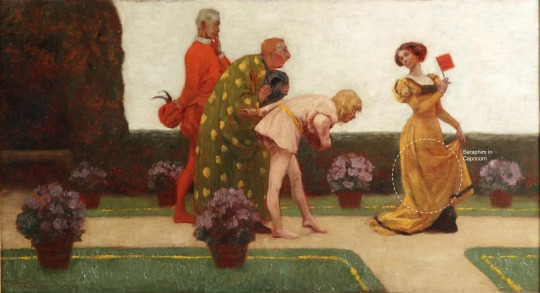
Die Freier by Franz Müller-Münster
Wherefore he reasonably assigned to the Seraphim, after God, the characteristic of imparting purification by fire.
…
The name Seraphim clearly indicates their ceaseless and eternal revolution about Divine Principles, their heat and keenness, the exuberance of their intense, perpetual, tireless activity, and their elevative and energetic assimilation of those below, kindling them and firing them to their own heat, and wholly purifying them by a burning and all- consuming flame; and by the unhidden, unquenchable, changeless, radiant and enlightening power, dispelling and destroying the shadows of darkness.
—Dionysius the Areopagite, Celestial Hierarchy
See also The Twelve Senses, Forces & World Views
1 note
·
View note
Text
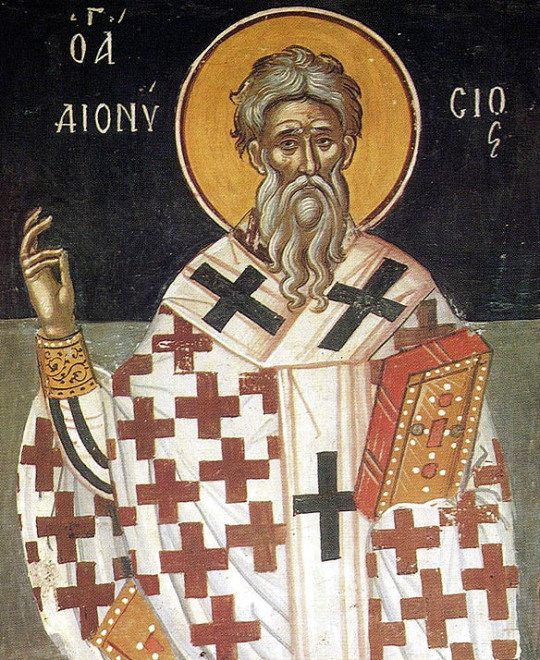
Love for God is ecstatic, making us go out from ourselves: it does not allow the lover to belong any more to himself, but he belongs only to the Beloved.
-- Saint Dionysius the Areopagite
22 notes
·
View notes
Text
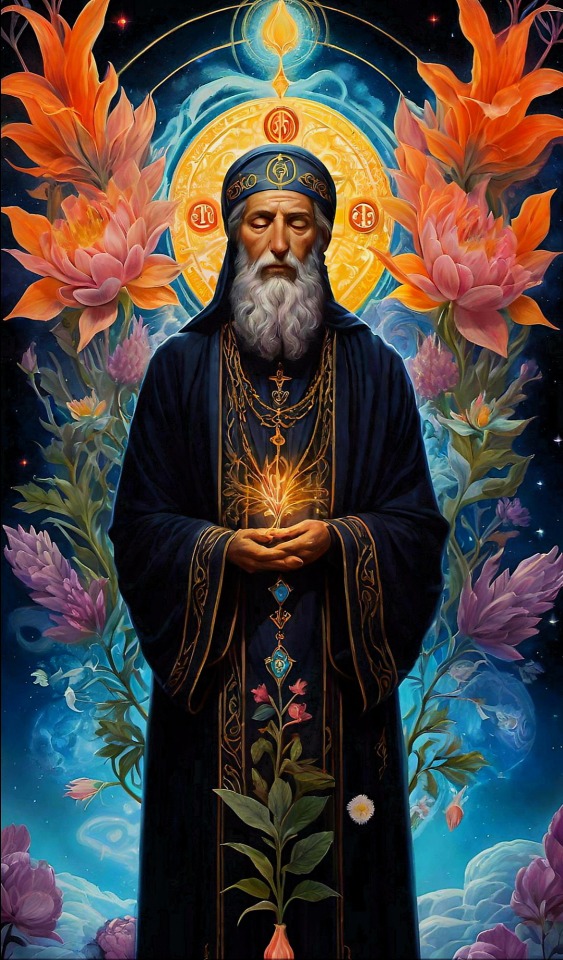
#artists on tumblr#ai artwork#alternative#fantasy icons#“Pseudo-Dionysius the Areopagite”#not a saint#Greek Orthodox theologian and philosopher
10 notes
·
View notes
Note
I've also been reading the three musketeers and the thesis chapter had me Cackling. the clowning on learning latin in particular and aramis as a character constantly emphasizing that being part of the higher sought after and hard-to-get-into regiment of the king's musketeers is just kind of a temp job for him is so funny. character of all time. (also bazin wanting aramis to be a abbe so bad is so good)
Disclaimer that I was actually not reading the book, just giving a look and toying with the idea of reading it soon. In fact I was reading something else, but the chapter was so funny I've abandoned it and will probably start The three musketeers instead xD
Yes! Bazin was so funny. While reading him I couldn't help but be reminded of Smee wanting to leave Neverland and done with Hook's obsession for Peter Pan. Aramis dismissing being a musketeer is hilarious, but it becomes particularly funny after reading Cyrano de Bergerac, where Cyrano mentions being a musketeer wistfully a couple of times. While I was reading the play I kept thinking that Cyrano's aspirations were basically to be Aramis haha
The use of Latin each character (the curate, the Jesuit, D'Artagnan and Aramis) does was indeed very funny, as well as insightful. I ended up reading a paper on the command each of the four protagonists has of Latin, and I loved the comparison it established between Athos and Aramis. I don't have an opinion on this formed because I have yet to read the book, which is a good thing (it will hopefully keep me from rambling), but I found what I read super interesting.
The chapter was very funny, and I felt Dumas managed everything very well? I loved the writing itself. Every part of the chapter worked wonderfully as a whole to enhance every aspect, making the funny parts more fun and drawing a more clear lively depiction of the characters.
By that I mean, basically, that even from the initial interaction between D'Artagnan and the hostess in which he asks for Aramis and she goes "the charming hot guy?" we can see Aramis' hypocrisy and unsteadiness by a mile. It's hilarious to read the chapter and see how Aramis ends up contradicting everything he does or says, at times not even that long after saying it xD
Which takes me to the thesis itself. Honestly, I loved the topics. I know they're supposed to sound a bit ridiculous and funny, but I thought Dumas conveyed very well the air of some of those intricate questions of theology that seem trifle but have a lot of implications, and end up being of a very poetic nature (such as the question about how many angels can dance on the head of a pin, one of my all time favourite questions). I wasn't very interested on the topic of the hands until the Jesuit commented that sprinklers "simulate an infinite number of blessing fingers"; that's beautiful.
Now, the topic Aramis himself proposes is just gorgeous. The way he defends it with a syllogism is so clever of Dumas considering the link between theology and the development of Logic. Besides that, despite how unorthodox the topic may appear at first, as Aramis himself puts it, there is a lot of truth in what he says about the world being full of temptations and it being very much a sacrifice to leave it, and how there lies the devotional act. I ended up being very intrigued by the potential development of this thesis in a mix of appreciation of the world as God's creature, and thus the leaving of the world as an act of true love for God, of more importance; how instead of an easy surrender, the struggle and doubts are as much reflection of the condition of humanity's frailty as it is a more steady and full surrender to God.
The topic of Aramis' thesis is somewhat paradoxical yet sound, and reflects doubts, as well as an appreciation for the world, aesthetics and beauty; I think it reflects so much of what makes Aramis himself.
And then, again, there's the whole hypocrisy through the entire chapter (which is what makes it for me haha). The way he says he isn't defending a regret at renouncing the world while proposing the thesis, that the mere idea is sacrilegious, how he insists he won't miss it, that friends are but shadows and the world a grave, and still how his resolution wavers almost instantly with his "And yet, while I still hold to the earth, I would have liked to talk with you, about you, about our friends" (and what a tender shaking), only to end up asking D'Artagnan to tell him about the world in the last line? Hilarious. What an hypocrite xD
But how extremely charming and adorable, I must admit! I love how when D'Artagnan tells him "But how are you going to live while you wait for me? No more thesis, no more commentaries on fingers and blessings, eh?", Aramis smiles and replies "I shall compose verses". Truly one of the characters of all time xD
#Aramis#The three musketeers#Les trois mousquetaires#I want to keep this to find later on. I'm truly sorry for the tags#And I'm sorry for talking a lot. I honestly tried to keep it short but there's so much I wanted to talk about‚ the chapter is so good#In fact there are a lot of things I haven't mentioned or developed that I loved#such as the fact that Dumas waves the chapters in such a way that that of Aramis starts with Porthos‚ while the chapter of Athos#starts with Aramis‚ linking the three friends together metatextually as they are linked together narratively by D'Artagnan visiting them#I also wanted to ask whether Aramis was the anon's favorite character and whether they had opinions on his position vs. Athos' for example#But the anon being an anon makes it hard to ask#I wanted to talk a bit about the developing of theology through paradoxes and Logic at times and how fitting that seemed for Aramis' thesis#He reminded me a bit of theologians such as Dionysius the Areopagite and Scotus Eriugena among others‚ and even Kierkegaard#But I must admit I always think too much about Neoplatonism and it's been long since I read these authors thoroughly so it may be a stretch#I had a lot of fun imagining the potential development of the thesis Aramis proposes though. Now I want the thesis now haha#And truly‚ the writing of the entire chapter was a thing of genius in how every little thing has later significance#to enhance something else. Such as the joke with Aramis moralising about the food‚ the conversation with the hostess‚#D'Artagnan's overall discomfort as if mad fanatics‚the world as something to renounce but the instant temptation of asking for his friends‚#the way D'Artagnan reads Aramis like a book and how he blushes and responds in poetic yet theological terms with too much fierceness#The way he blushes and exposes himself#And the entire thesis Aramis proposes being a good reflection on his character (no wonder he is adamant on pursuing that one#and only that one‚ like a calling). How the chapter and the thesis are a good summary on his character#But also how those lines I quoted‚ D'Artagnan asking what hell do and Aramis smiling and replying he'll write verses‚ are as well#Truly‚ the writing was so good. And yes‚ I agree with the anon completely#Character of all time#I suspect I'd love him immensely#Even in this chapter alone he was everything I wanted and more of what I didn't dare to expect. Now I just want to see him plotting#I loved these fragments so much that now I fear reading the entire book and being let down xD#Oh but I'm rambling again...#Anyway! Thank you for the ask and sorry it took me so long to reply. I had a lot of fun with it#Too much‚ that's why I took so long to reply. I read and reread and then I wasn't able to summarise. Thanks for indulging me in my fun xD
10 notes
·
View notes
Text
Wow the Byzantine mosaic artists of the 13th century sure fucked up when they made archangels look like normal winged people next to their depictions of seraphim/cherubim. Not "Biblically accurate" at all of them. Boy I really hope somebody got fired for that blunder
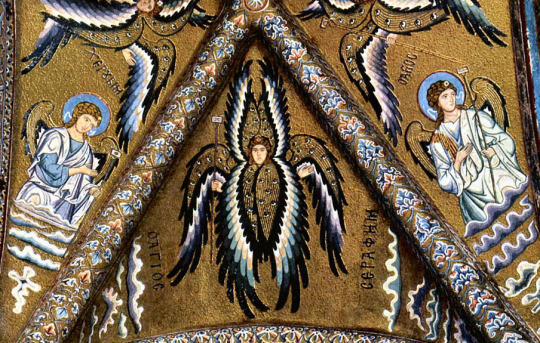
#they're just! a different kind of angel! they're equally accurate or inaccurate to the other kinds#(accurate or inaccurate since. ppl like Dionysius the Areopagite would say that the features these angels are described with-#aren't really visual descriptions as much as they are symbolic shorthand for a sort of presence that humans couldn't fully#describe or comprehend)
4 notes
·
View notes
Note
Does the Good Omens universe follow the same angel hierarchy that the bible does?
There is no angelic hierarchy in the bible.
Here are five different Jewish angelic Hierarchies:
There are Islamic heirarchies:
And there are many Christian heirarchies, most of them based on the 6th century work of Pseudo-Dionysius the Areopagite.
2K notes
·
View notes
Text
Crowley was Raphael?
WARNING: MAJOR GOOD OMENS 2 SPOILERS
Ok, so in the last few years we all enjoyed the headcanon that Crowley was the Archangel Raphal pre-Fall. To be completely honest, in season one this theory didn't make a lot of sense because we knew basically nothing about Crowley as an angel except for the fact that he helped create the stars and fell because he asked too many questions. So, even though it was a nice and interesting theory, I thought it would remain that, a theory.
Well, seems like this theory is basically confirmed now at the end of season 2. But let's start at the beginning.
First, we have to talk about the Hierarchy of Angels in Christianity. This Hierarchy was theorized by Pseudo-Dionysius the Areopagite in his book De Coelesti Hierarchia (On the Celestial Hierarchy). Dionysius described nine levels of spiritual beings which he grouped into 9 orders.
Highest orders:
Seraphim
Cherubim
Thrones
Middle orders:
Dominions
Virtues
Powers
Lowest orders:
Principalities
Archangels
Angels
Now, a lot of people asked Neil why the Archangels have so much power if they are so low in the Hierarchy and he said that he and Terry actually tought of archangels and Archangels as different beings.
So we have the arch-angels, in thre sense of being just above the lowest Choir of angels, and then we have the Arch-angels, in the sense of being above all angels.
Actually, the term archangel itself is not found in the Hebrew Bible or the Christian Old Testament, and in the Greek New Testament the term archangel is used referring to Michael, who is called 'one of the chief princes,' and 'the great prince'.
The idea of seven archangels is most explicitly stated in the apocryphal Book of Tobit when Raphael reveals himself, declaring: "I am Raphael, one of the seven angels who stand in the glorious presence of the Lord, ready to serve him."
In Judaism the Archangels are given the title of śārīm, meaning "princes", to show their superior rank and status, so they are also called "Princes of Heaven".
In season 2 episode 6, when Crowley is in Heaven trying to find any info on Gabriel, Muriel gives him the missing Archangel's file explaining that even if they wanted, they couldn't show it to him, since only angels above the rank of Dominions could access it. Immediately after, without putting in any effort, Crowley opens the file, saying that he was an angel once and they never bothered to change passwords. (I totally read a fic like this btw).
When the Archangel Saraquel meets them and recognises Crowley, she says that they worked together on the Horsehead Nebula. So Crowley must have been pretty high up in the ranks if he worked with an Archangel.
When they show us the scene of the trial, Gabriel is ready to be cast down to Hell, but the Metatron stops him and says:
"You are not going to hell. For one Prince of Heaven to be cast into the outer darkness makes a good story. For it to happen twice makes it look like there is some kind of institutional problem."
So we know that one of the Seven Archangels has Fallen, and it could be Lucifer, even though in the bible it is never stated that he was an archangel, but wouldn't they have said so if it were the case?
Also in episode 2, when Shax tells Crowley that Heaven and Hell think Aziraphale has something to do with Gabriel's disappearence, she says:
"A miracle of enormous power happened last night. The kind of miracle only the mightiest of Archangels could've performed".
Reminds you of something? Raphael, one of the mightiest of Archangels?
I really hope they will confirm the theory in season 3.
#go2 spoilers#good omens spoilers#good omens#crowley was raphael#antony j crowley#ineffable husbands#neil gaiman#good omens 2
513 notes
·
View notes
Text
Alright, I've had a few people ask for this now so time to take a break from the big draft I’m writing to dig a little deeper on angel rankings in relation to Crowley.
Before we get into it I want to preface this by saying I am not a religious scholar. Like many of us I have a complicated relationship with religion and as a result this stuff was a long time special interest of mine but, as always, take it with a grain of salt.
To be frank, even if I was an expert, I think it’s also important to keep in mind that the Good Omens angel hierarchy has already taken some liberties on its own. It hasn’t been shy about reinterpreting things to suit its needs or about pulling from various sources to establish its own lore. It's definitely its own beast and there's no guarantee the universe operates the same rules that have become the most popular ones.
That all being said, let's get cracking.
So in canon we actually don't know that much about angelic rank. Before season two we knew there were Principalities and Archangels and that's about it. This season decides to give us a little more information. Muriel is a Scrivener (likely they'd fall under the general Angel category) and then we get a nod to Thrones and Dominions being a thing. We also learn there are orders/classes of various ranks.
With the exception of Scrivener which isn't a traditional rank at all as far as I can tell, these ideas all fit under the traditional Christian angel hierarchy.
The most influential version of this hierarchy comes mostly from Dionysius the Pseudo-Areopagite's De Coelesti Hierarchia (On Celestial Hierarchy). He divides angels into three Spheres, with three Orders within each Sphere. The Lowest Sphere contains the orders Angels, archangels (different from Good Omen's Archangels who are at the top of the food chain so to speak), and Principalities. The Middle Sphere contains the orders Powers, Virtues, and Dominions. And then the Highest Sphere contains Thrones, Cherubim, and Seraphim.
Now onto the angel that would become Crowley.
Thanks to us witnessing Crowley opening a document only accessible to Dominions and above, we can eliminate the lower half of these rankings.
This leaves us with Dominions, Thrones, Cherubim, Seraphim and the Good Omen’s version of Archangel.
Dominions are tied to things like regulation. Their job is to keep passions in check and deliver justice and judgment (to be frank these last two are in some capacity apply to most rankings of angel), They’re built to keep ranks beneath them organized and optimize their performances. They’re organizers. They’re functionally middle management and are sometimes known as Lordships. They’re also occasionally tied to the set of angels that destroyed Sodom and Gomorrah.
The really only thing that even kind of suits him here in my opinion is the interacting with lower ranks bit but the vibe doesn't seem quite right with that. Crowley as we know him is not even really a leader even in his own schemes and has a tendency to rely on his considerable talent at improvisation and quite frequently on the cues Aziraphale tends to send him. (We get a stellar example of this dynamic actively in play in Episode 2 this Season). We also know now that the angel in question tended to work alone. He seemed baffled by the concept of Earth, as if it had been a long time since he’d had a check in with Head Office.
So Thrones are what people tend to think of when you say the phrase Biblically Accurate Angel. They're the wheels with a bunch of eyeballs. They contemplate the power of God and have, you guessed it, ties to justice and judgment but in a more contemplative sort of way. They are associated with peace and submission, except for when they are sometimes also associated with the erelim - a ranking in the Jewish Hierarchy that tends to be more of a warrior class. They're maybe most famously associated with being a part of the chariot that moves God's throne around. They live where material form begins to take shape and are tasked with maintaining cosmic harmony.
Honestly I don't mind this for Crowley. That last bit especially sounds close to what we see him doing. And there's something very fun to me about a former Throne going off and getting himself a big gaudy throne. I’ll admit I have a hard time associating him with something so passive and again I feel like it doesn't quite fit how out of the loop he was about Earth, but this is probably the second favorite option of mine here.
If Thrones are the wheels of God’s Throne then the Cherubim are the ones making those wheels turn. They’re often represented as pushing Thrones about and attending God directly. Their job is to magnify God’s glory and serve as representatives of God’s power. They also, notably, were thought to be the superhumanly strong guards tasked with the protection of Eden.
Because of this we get a very old piece of theory: that Aziraphale was a Cherub who had been demoted. I’ve gone through phases with this theory but I definitely think it’s at a minimum fun to consider. And though I'm hesitant to take any Amazon promotional materials too seriously during the strike, there's a post here they've made recently that refers to Aziraphale as such.
Partially because this theory is so old and so rooted in the lexicon of my headspace for this media, I don't like this for the angel who would become Crowley particularly well. Superhuman strength feels weird in regards to him, as does situating him as a guard of Eden. And even if that line from season 2 where Crowley talks to Beelzebub about scaring that cherubs was talking about young angels and not literal cherubs, it seems like a weird phrasing for someone who was once the other kind of cherub to use. I like this better than Dominions but not nearly as much as Thrones.
Now Seraphim are a little unique. Their primary job tends to get framed as singing praise to God. They seat themselves around God's throne and sing holy, holy, holy at God. Several interpretations of them argue that they are different from angels entirely and only got grouped in with them in later texts like De Coelesti Hierarchia. They purify Isaiah in a vision he has and have strong associations with smoke and heat. They're tied to clarity and purifying via fire and occasionally are thought to help keep the world in order. Interestingly enough the word Seraph comes from saraph which means to burn and Seraphim can be translated as the fiery ones or those who kindle. Saraph is also used in certain contexts to describe a fiery flying serpent.
Now I’ll admit the Seraphim theory was always one of my favorites. If the show hadn’t recently been adding more ticks to the Archangel column I think I’d still probably be in this camp. There's the obvious bits that tie in here like the fire and snake imagery associated with both. But I can't help but to think of how often we get Crowley implying that just maybe God intended what they'd done to be the right thing. Or that scene where Crowley prays on the throne in season 1. He hangs off of it instead of sitting and begs God to not destroy them. It's an echo of a twist on what a Seraph would do in Heaven.
Now that just leaves us the Archangels. I won’t reiterate my other meta other than to link it here, but I do think the show at the very least wants us to consider this as a possibility.
In my opinion? Seraph and Archangel sit near the top of the metaphorical likelihood scale. I'd then follow this up with the Throne, then the Cherub, then the Dominion in order. But who knows! Half the fun of Good Omens is it doesn't always play by the traditional rules. And honestly there's something fun in never having an answer here. After all, no matter where he started, Crowley is Crowley now and that's the way it should be.
#good omens#good omens spoilers#gos2 spoilers#good omens season 2#good omens meta#Crowley#angel hierarchy
221 notes
·
View notes
Text
More About Angels
All information is taken from the Bible and Christian/Jewish /Abrahamic religion studies
Seraphim
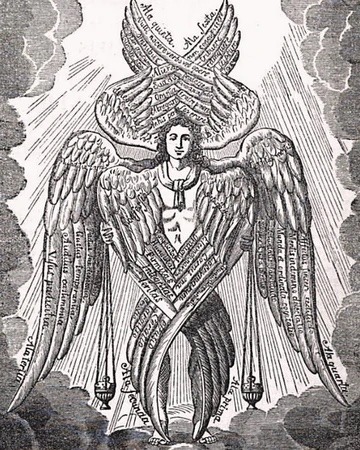
Seraphim are said to be the caretakers of God’s throne and continuously sing his praises
“The name seraphim clearly indicates their ceaseless and eternal revolution about Divine Principles, their heat and keenness, the exuberance of their intense, perpetual, tireless activity, and their elevative and energetic assimilation of those below, kindling them and firing them to their own heat, and wholly purifying them by a burning and all-consuming flame; and by the unhidden, unquenchable, changeless, radiant and enlightening power, dispelling and destroying the shadows of darkness.” — Dionysius the Areopagite
Seraphim are often associated with a burning love for God and thought to be born inflexibly toward God
Seraphim are said to have God’s knowledge revealed to them which engages their role to divine levels though they cannot comprehend it all
In Islam they are associated with “Bearers of the Throne”
In some texts Lucifer, Beelzebub, and Leviathan held the rank of Seraph
In the game
• Lucifer (formerly), Michael, Raphael, and Simeon(formerly) are seraphim
• Mammon believe Luke can become a Seraph
• Asmodeus describes them as bossy
Cherubim

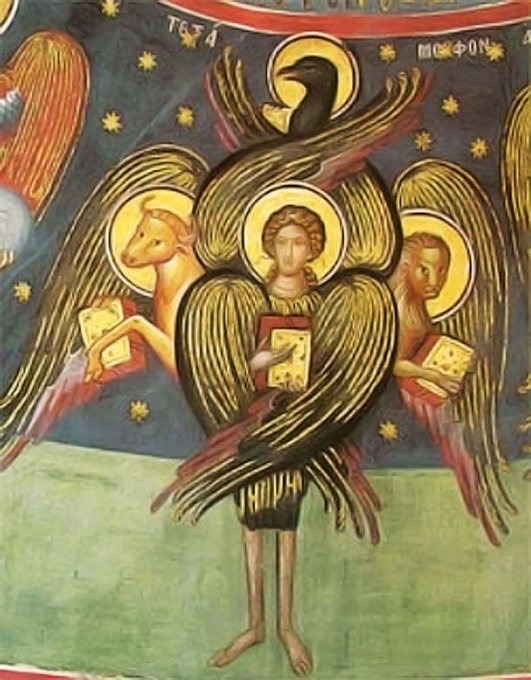
Cherubim are the most frequently appearing heavenly beings mentioned in the Hebrew Bible. They are described with many different roles but it’s generally mentioned they transport God’s throne, pull chariots of God, or carry him upon their backs.
Cherubim are often associated with Knowledge
In Islam Michael, Gabriel, Raphael, and Azrael are said to be Cherubim
In the game
• Beelzebub reached at least the position of Cherub
Thrones
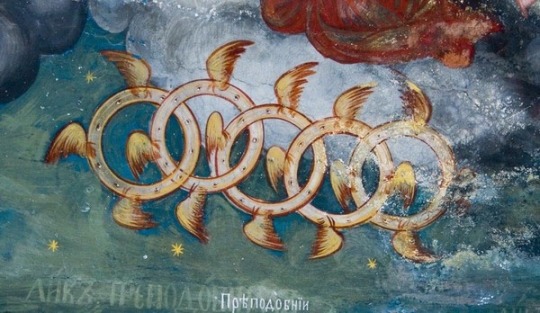
Thrones are also referred to as Ophanim and Galgallin
The Dead Sea Scrolls confirmed these beings to be angels
In the Bible Thrones are described as functioning like chariots and are characterized by peace and submission. They mete out divine justice and maintain cosmic harmony
Some texts site Asmodeus as having been a Throne
In the game
• Mammon was a Throne and acted as Lucifer’s assistant
Dominions or Lordships
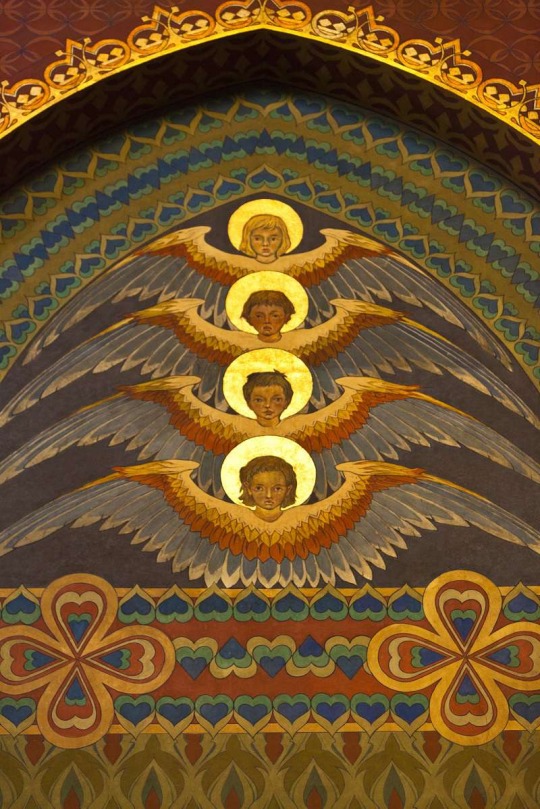
Dominions are said to deliver justice in God’s place, show mercy to humans, and lead lower-ranking angels and help them do their work
In the Bible it was Dominions that completely obliterated the cities of Sodom and Gomorrah after warning the only faithful people there to leave
Their main role is to act as governors and maintain order of the cosmos
In the Game
• Simeon mentions they watch over the human world
Virtues
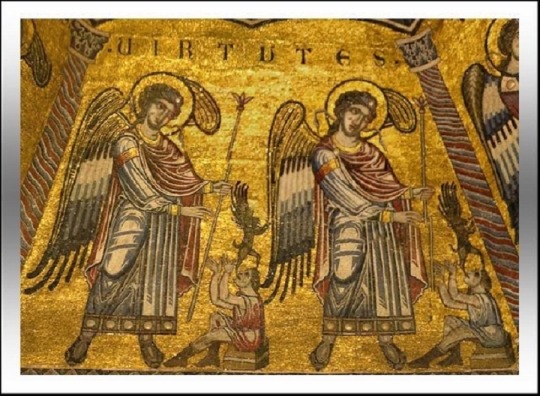
Virtues are described as having control over the elements and protecting nature.
They also encourage humans to strengthen their faith in God and assist with miracles
Powers or Authorities
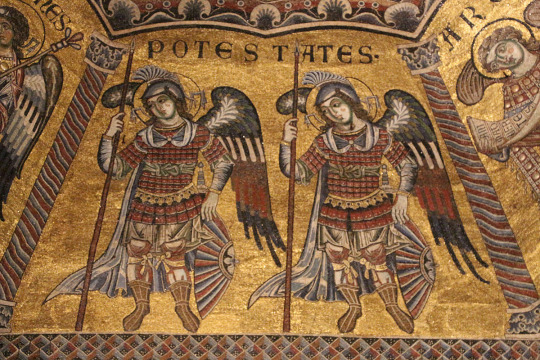
These angels are given their name because they have authority over evil and are able to restrain evil to stop more harm from being done
Principalities or Rulers
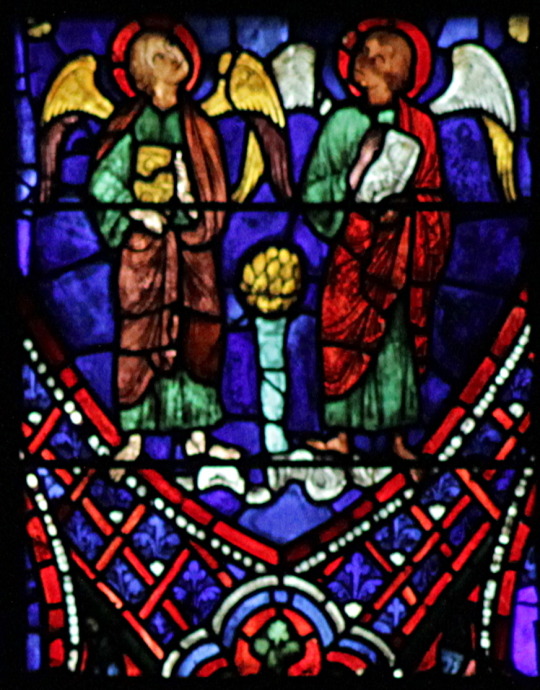
These angels are tasked with guiding and protecting nations and groups of people.
Some texts site Belphegor as having been a Principality
In the Game
• Luke hopes to one day be a principality
• When Luke reveals he and Simeon were sent to earth, the brothers think it’s weird as this is usually the job of Principalities
Archangels
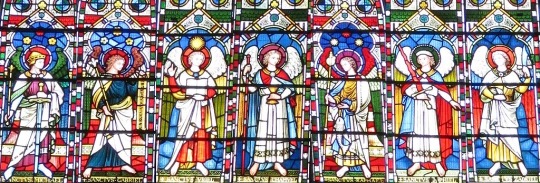
The specific role appears to vary from one archangel to the next. Something they have in common are being protectors and dealing directly with humanity in one way or another.
Gabriel, Michael, and Raphael are mentioned as archangels in most branches of faith, Uriel is mentioned as well but not always.
Many branches depict seven to eight archangels but there are said to be thousands though very few are named.
In the Game
• Michael, Raphael, and Simeon (formerly) are said to be archangels
• Luke describes archangels as being powerful warriors
• Mammon was an archangel before being promoted to Throne via Lucifer’s recommendation
Angels
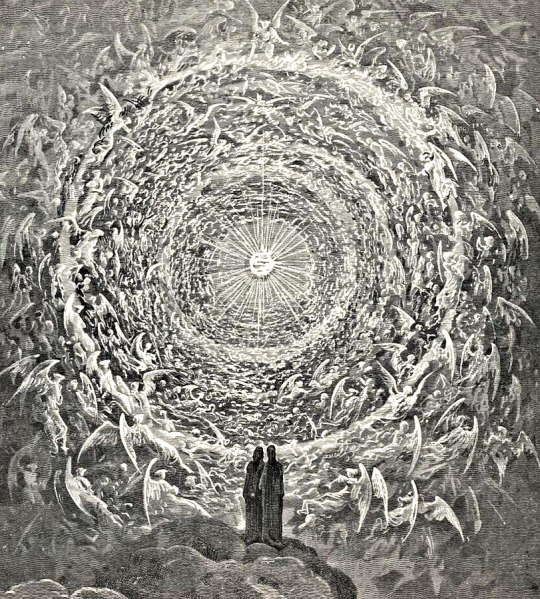
The lowest rank of angel is not well described as most angels, despite their rank, are simply referred to as angels however some Christian denominations believe this rank act as guardian angels—angels assigned to specific people
Angels are said to be able to disguise themselves as human and walk among humans testing them and aiding them
In the Game
• Angels are the main inhabitants of the celestial realm
• They have halos, appear bright and shiny to demons, and can fly
• Luke is currently the lowest rank, Angel. Angels have not yet been assigned higher ranks based on their powers at birth and what they are best at.
#obey me shall we date#obey me celestial realm#obey me angels#obey me michael#obey me raphael#obey me mammon#obey me lucifer#obey me beelzebub#obey me simeon#obey me luke
559 notes
·
View notes
Text
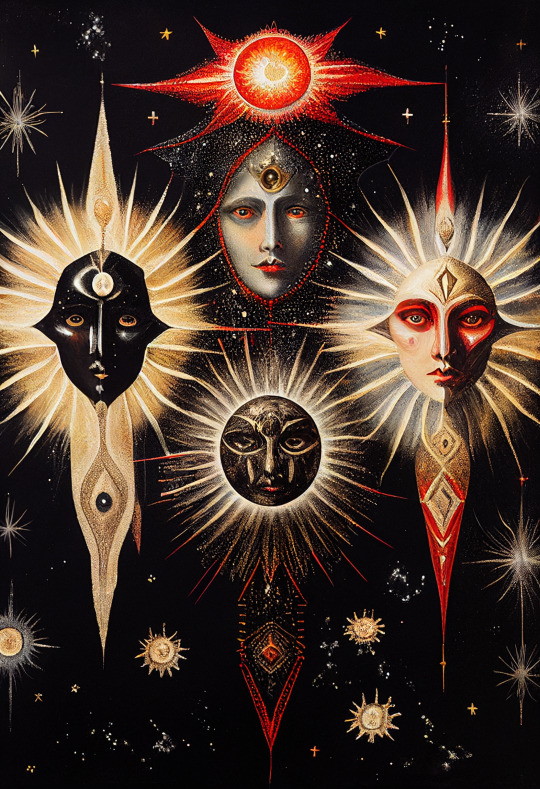


Celestials
Talon Abraxas
The Celestial Hierarchy of Pseudo-Dionysius the Areopagite
The angelic hierarchies divided into three triads:
First --Seraphim, Cherubim and Thrones
Middle- - Dominions, Virtues and Powers
Last -- Principalities, Archangels and Angels
51 notes
·
View notes
Text
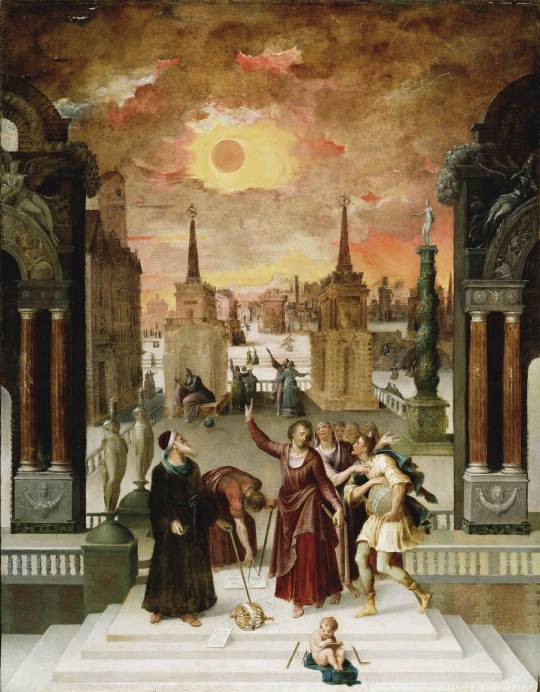
CARON, Antoine
Dionysius the Areopagite Converting the Pagan Philosophers
1570s
Oil on panel, 93 x 72 cm
J. Paul Getty Museum, Los Angeles
74 notes
·
View notes
Note
quite certain you've probably had this ask before and have answered it but what books/specific sections of the bible do you recommend reading for angel research? and are there any good websites/other sources/other religious texts outside of the bible?
Hello!
Off the top of my head, I would say the biblical books that are more angel-related than others are Genesis, Ezekiel, Job, Revelation.... hmmm I would say the gospels tend to mention angels being physically present quite a bit too — like when Jesus leaves the desert and the angels run to comfort him (very cute of them btw). And, of course, you might want to take a look at the Book of Enoch.
One non-Bible source I remember very well is The City of God by Saint Augustine, specifically Book 11. For a secondary source on Augustine, I highly recommend Augustine's Theology of Angels by Elizabeth Klein.
I like Augustine's stuff in general, and I personally try to look for angel mentions in theological/philosophical work before Pseudo-Dionysius the Areopagite's Celestial Hierarchy (which took over western christian angel understanding). I do still recommend reading Celestial Hierarchy mostly because it's what you're going to find in every single angel-focused book/site.
I don't really have website recs for that above reason but I do make use of Christian q&a sites a lot because they tend to stick very strictly to what the Bible says and I like knowing what the contemporary consensus tends to be about angels for Christians.
Also, I really like to crawl along JSTOR and I'd really like to set up a list of my favorite articles to share, but it'll take a while. I really recommend reading a source — for example, Thomas Heywood's The Hierarchie of the Blessed Angells, which I quite like – then looking it up on JSTOR to understand what the historical context behind it is and what it might be responding to (researching Heywood's book is what made me see why the 9-level angel hierarchy concept has been so persistent in angelology).
One JSTOR paper I'll go ahead and link now is this one about angel Lucifer's beauty that I like very much.
Anyway, I swear one day I'll have a very neat organized database of sources......... I Swear.
#also of course Milton and reading discourses surrounding Milton (!) are very helpful#mostly because the discourses will go into detail about the understanding of angels in the period and a general history of them#mine#ask#theology
39 notes
·
View notes
Text
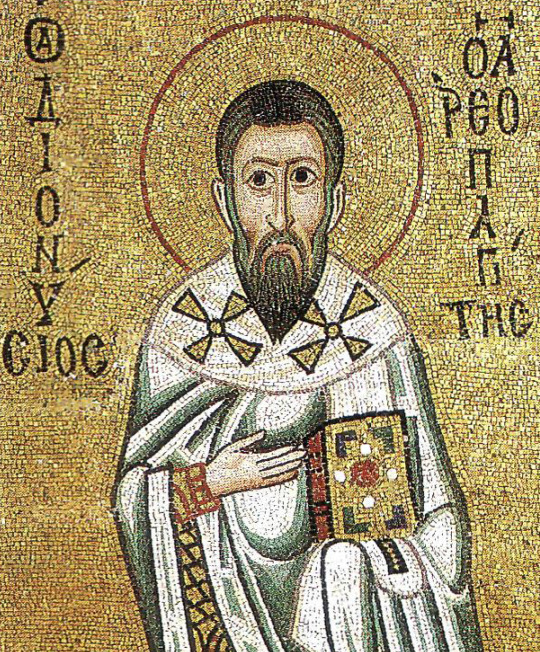
Leave the senses and the workings of the intellect; and all that the senses and the intellect can perceive, and all that is not and that is; and through unknowing reach out, so far as this is possible, towards oneness with Him who is beyond all being and knowledge. In this way, through an uncompromising, absolute and pure detachment from yourself and from all things, transcending all things and released from all, you will be led upwards towards that radiance of the divine darkness which is beyond all being.
Entering the darkness that surpasses understanding, we shall find ourselves brought, not just to brevity of speech, but to perfect silence and unknowing.
Emptied of all knowledge, man is joined in the highest part of himself, not with any created thing, nor with himself, nor with another, but with the One who is altogether unknowable; and, in knowing nothing, he knows in a manner that surpasses understanding.
-- Saint Dionysius the Areopagite
11 notes
·
View notes
Text

Pseudo-Dionysius the Areopagite, The Mystical Theology
94 notes
·
View notes